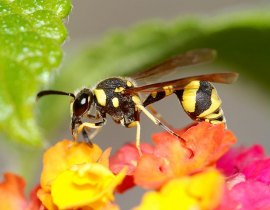Professional Pest Control & Wildlife Management
Potter Wasps
Potter wasps are interesting cousins of the social wasps which can plight a picnic in summer. The name 'Potter wasp' or 'Mason wasp' covers a wide variety of similar species. They are all solitary wasps and pose little risk of stinging humans.
-
Risks
Potter/Mason wasps do not pose any real risk to humans. If you are by chance stung by one and feel unwell seek medical assistance immediately.
-
Treatment
No treatment should be needed for these creatures, the risks are so minimal that unless you feel it necessary they can be left alone.
-
Life Cycle
Differnt species have different preferences as to where and how they construct their nests. Some will use beetle holes in the ground, gaps in concrete and some will produce their own exposed nests out of mud. These nests can be a single chamber or have multiple brood compartments which will be stored with enough food (insects, caterpillars etc) for the eggs to feed upon once hatched. The female will have no part in raising her offspring.
The caterpillars and insect larvae she brings back to nest is never dead, to keep it fresh for her own larvae to feed upon these wasps paralyse only their prey. The adult wasps feed upon rich nectar to fuel themselves.
Related
- False Widow Spider Removal
- Cluster Fly help
- The trouble with fleas?
- Mole Catching in Suffolk
- Rats in the Garden
- Wasp Nest Control
- Rats in your chicken Coop
- Anaphylaxis
- Bee Swarms
- Becoming a Beekeeper
- Rare Breed Poultry
- Pest Control with Birds of Prey
- Un-marked vehicles available
- Rabbiting with Ferrets
- Myxomatosis
- Poll-Tex Mesh
- Honorary Member Russell Wallis
- Free Rabbit Control


